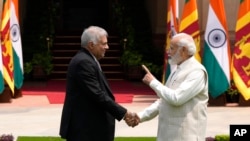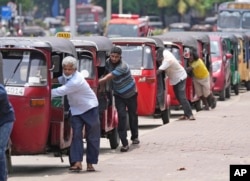India and Sri Lanka boosted their economic partnership by signing a series of agreements on energy, trade and connectivity projects following talks between Indian Prime Minister Narendra Modi and Sri Lankan President Ranil Wickremesinghe in New Delhi on Friday.
Wickremesinghe was on his first visit to India since he took charge a year ago after an economic crisis engulfed the country and led to the resignation of his predecessor.
He came to New Delhi as both sides reset a relationship that has been set back by growing Chinese influence in the strategic island nation that lies on India’s southern tip. Before Sri Lanka’s economy collapsed, Beijing had poured in billions of dollars to build infrastructure projects that India feared could affect its security.
India provided aid last year
Ties between Colombo and New Delhi received fresh momentum last year, though, after India extended $4 billion in aid to help the beleaguered country.
Addressing reporters along with Wickremesinghe, Modi said that being a close friend, India had stood “shoulder-to-shoulder” with its neighbor during the crisis and that a prosperous Sri Lanka was key to regional stability.
“Sri Lanka has an important place in our ‘neighborhood first’ policy,” Modi said. “We believe that the security interests and development of India and Sri Lanka are intertwined."
Wickremesinghe said that his visit had “reinforced trust and confidence for our future prosperity in the modern world.”
In a signal of deepening bilateral ties, the two countries unveiled an economic partnership vision that focused on enhancing connectivity and investments.
Modi said the two sides will conduct feasibility studies on laying a petroleum line between the two countries that would give Sri Lanka access to affordable energy. They also will explore the possibility of building a land bridge. The closest points between the two countries are just 50 kilometers apart.
The two countries also will work to connect their electricity grids and cooperate in the renewable energy sector. New Delhi will develop a port and an economic hub at Trincomalee, on Sri Lanka’s northeastern coast.
The two leaders also expressed support to implement a plan for the Sri Lankan government to share power with the country’s ethnic minority Tamil population that lives in the island's north and east provinces. The Tamils of Sri Lanka have long had close ties with Tamils living in southern India.
“We hope that the government of Sri Lanka will fulfill the aspirations of the Tamils,” Modi said.
Optimistic about recovery
Wickremesinghe expressed optimism about economic recovery in his country, which secured a $3 billion bailout package from the International Monetary Fund in March.
“I have set Sri Lanka firmly on a path of economic reform,” he said.
For Sri Lanka, a top priority is to get countries like India and China to agree to a debt restructuring plan. Last year, the country defaulted on its $46 billion foreign debt.
But balancing ties with India and China still poses a challenge. Last year, Sri Lanka allowed a Chinese research vessel, Yuan Wang 5, to dock in a port built by Beijing — despite objections by New Delhi, which feared it was a spy ship.
Wickremesinghe’s visit to India, however — his first overseas trip since becoming president — underscores that ties between the two neighbors are again set on a growth trajectory.





